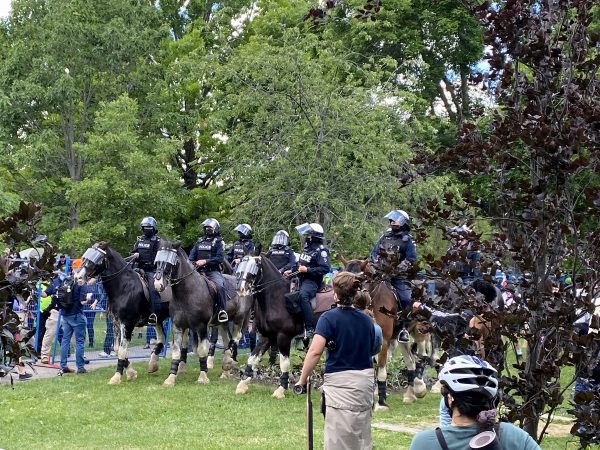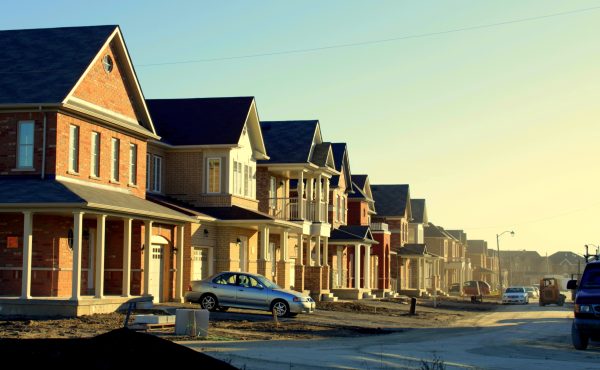
It feels like matters of policing, never far from view, have hung particularly heavily over the city’s business in this past month — an arc that began early in the new year with Mayor John Tory’s $50 million house-warming present for the new police chief, extends to the city’s ham-fisted response to violence on the TTC (not to mention the homelessness crisis), and currently informs the budget discussions about how we spend tax revenue that never seems to be adequate.
University of Toronto law professor Kent Roach watches these developments with a keen eye, not just for what they say about the practice of policing, but also about how Canadian society governs its law enforcement institutions. In his latest book, Canadian Policing: Why and How It Must Change (Irwin Law, 2022), Roach — a veteran of the Ipperwash and Arar inquiries, and an advisor to the Public Order Emergency Commission — argues that law enforcement agencies operate in a democratic fog that militates against the kind of accountability such organizations need. The book was short-listed for the 2022 Writer’s Trust Balsillie Prize in Public Policy.
For decades, Prof. Roach writes, Canadian governments have ducked responsibility for laying out clear rules governing police operations. Politicians have opted instead to rely on Supreme Court rulings about police conduct that are often difficult to implement consistently, as well as civilian oversight bodies that do little to deter the worst practices of policing. One result, he says, is the paradox of what he describes as the over-policing and under-protecting vulnerable populations and communities. Another: the abject failure of law enforcement that occurred on the frozen streets of Ottawa last year, which will be the subject of the much-anticipated forthcoming report by Justice Paul Rouleau.
“There is a large democratic deficit at all levels of Canadian policing that needs to be addressed,” Prof. Roach writes. “Those with responsibility for the police — whether they be the responsible minister, the police board, or the local council — need to be prepared to take responsibility for policing policies and to be held accountable for such decisions. The alternative of allowing the police to govern themselves should not be acceptable in a democracy.”
I spoke last week with him to hear his take on what’s been going on in Toronto.
Spacing: Mayor John Tory announced he is adding $50 million to the police budget and we’ve lately seen these directives to put more cops on the transit system. How you read these moves from the point of view of the governance of the Toronto Police Service?
Kent Roach: In theory, the mayor and the council should be able to make these decisions. After George Floyd in 2020, there was a minority on council who wanted to reduce the police budget and redistribute it. Although I favoured their approach, I also accept as a democrat that we’re not a majority of the council. Much of the book is a plea for democratic policing, but I accept that democracy is entitled to make what I think may be mistakes. I also think this shows that the defunding movement that was started in the wake of George Floyd just hasn’t really gone anywhere. And defunding as a slogan doesn’t capture what I think many of its proponents wanted, which was a re-funding of community and social services.
Spacing: Council last year established a new community crisis response service. But the mayor and the new police chief immediately reached for police on the TTC instead of deploying psychiatric nurses or social workers. Did we just forget about that new service?
Roach: Yes, I think we did forget about that part. I think some of this represents the lack of detailed research on what works and what doesn’t work in Canadian policing. Go back to the Rethinking Community Safety report, which in about 20 pages, and with a broad coalition of groups, including the Gerstein Center, the Canadian Civil Liberties Association, and Black Lives Matter, looked at some of the research from the United States to support de-tasking, albeit de-tasking with evaluation. But we really don’t have a lot of good research about whether we’re getting value for money by adding extra police officers at a cost of more than $100,000 a year.
Spacing: One more question about the issue of violence on the TTC. Is it clear in your mind that this is actually a problem or are we just dealing with a random series of incidents?
Roach: That’s a question criminologists will be able to answer in about five years’ time. But I do accept in a democratic policing model, there is a need to respond to public anxieties. Certainly, as a person who uses the TTC, I’ve noted that these incidents have taken place at a range of stations. Whether it’s a blip or not, it is legitimate to expect a response. I just hope that it is a response that is better informed by research, and, frankly, cost effectiveness.
Spacing: What you make of the new memorandum of understanding between the Toronto Police Service and the Toronto Ombudsman? Is it filling a gap in the legislated accountability mechanisms that already exist for police, or is it an extra layer?
Roach: There are many layers of accountability to the police. One of the reasons I wrote the book was that I felt, as a lawyer, that I knew most of these processes, whether it’s the SIU, police complaints, civil lawsuits, and the like. I’m skeptical whether they are improving policing, because they happen after the fact. They often have high levels of burden of proof, especially with the SIU, although these may be necessary to ensure the rule of law is applied to police officers like anyone else. I see no evidence that [these accountability mechanisms] are improving police.
Now, the MOU with the Ombudsman revolves around quality of service to the public. And I think that that is something where review has been generally lacking. We review the police in multiple ways to ensure the propriety and the legality of their actions. But we rarely review the police to ensure the efficacy or the efficiency of their actions. That takes a very different skill set, which looks not at individual acts, but at data, to the extent to which this data is available. I don’t instinctively think that more review, especially of the ex poste variety, is the answer to policing. I saw this in the G-20, where there were about ten different reviews, and some of them reached very different conclusions. So I’m skeptical about simply adding another layer of review.
But if the Ombud’s review is one that is focused on efficiency, and policy, I think it may have a role to play. The other thing I would say is, under the Ford government, there are real concerns that the underfunding of the OIPRD will prevent it from doing the systemic reviews that it had done with respect to G-20, strip searches, and other areas. I’m a big fan of systemic review because I think you get your biggest bang for the buck.
Spacing: We’re at the beginning of a new term of council. We have a new police chief. We have this bulked up system of mayoral powers. Is there anything that Toronto council, the mayor’s office and the Toronto Police Services Board should be doing at this point to improve democratic policing in Toronto?
Roach: I don’t think this is the road Mayor Tory has taken, but I could imagine someone like Mayor Tory saying, “you know, police is the biggest budget item, we’re under huge budget strain, we’ve got to make sure we’re getting value for money,” and to look at policing through that lens. If a mayor or a significant number on council took that approach, not necessarily using the divisive language of defunding, but asking, “are we getting this right?” then I think that would be a way forward.
One of the things I really criticize in the book is the Community Safety and Well-being plan that Toronto came up with [in 2021]. It’s frankly a pitiful document compared to the Rethinking Community Safety document prepared by civil society. And it’s pitiful even compared to what other cities like Hamilton and Ottawa have done. Of course, the province is partly to blame. I give the province credit for requiring these community safety and wellbeing plans. But having looked at quite a few, a lot of them come down to, “we don’t have enough housing, we don’t have enough addictions treatment, and we’re never going to have enough money with our tax base unless the province ponies up more money.” At the provincial level, you have the same silence. The community safety and well-being plans have a potential to break down silos. But all the funding and all the accountability still runs in the silos, so the community safety and well-being plans are fighting against the current bureaucratic life of the municipal or provincial levels. We still haven’t gotten it right about how to implement them.
Spacing: Given what’s been happening over the last couple of months with the surge of violence in public places, would you say it’s time for council to give that document an overhaul?
Roach: Yes. That document really doesn’t show a lot of policing involvement. Potentially, this is a strong mayor and [he could be] saying, “you know, this plan means something, and we’re going to do evaluation, and we will potentially use this plan to redistribute budget among different parts of city government, including the police.” The problem has been that the police are pretty confident they can get raises in their budget.
Spacing: I want to ask you about police use of technology. We had a very short public consultation period last fall about the use of AI-based policing technologies. Is this an adequate way for the public to engage with the way the police use and acquire technology that can be very powerful in terms of surveillance?
Roach: It’s a good question. I think that body cameras are partly a response to George Floyd, but they are only used with respect to after-the-fact accountability. I’m not saying that’s not important. A body cam may very well lead to more successful prosecutions of police who engage in either criminal or other forms of misconduct. But the question then is, what happens next? What do you do to ensure it doesn’t happen again? Just relying on deterrence — I’m not a real believer in that when it comes to criminal law in general. In policing, what you see is a lot of concern about police not knowing where we want them [to be] with respect to using surveillance as a possible crime control technique. I think that’s why we need democratic policing. We need a democratic debate. There will be people that will lean on the privacy side and there may be people that will [say], “if a camera is half as effective and a hundredth of the price of putting out a police officer, given that we’re already underwater when it comes to the budget, then let’s do it.” To me, that is a quintessential democratic debate, and we should just allow that to play out.
The problem is, does it play out in city council? Not really. It would have to play out at the Police Services Board and police service boards may not necessarily have the resources or the will to make informed decisions about these new forms of technology. The other thing is that when you’re talking about technology, you’re really pushing the limits of democratic capabilities. Even if you had a good debate in 2023, two years later, you’re going to have a new technology, and you’re going to need to have that debate all over again.
Spacing: You say in the book that you’re still a fan of the Peel Principles of policing. (Peel, a British politician, famously said, “the police are the public and the public are the police.”) If you had to pick something that we should really learn from what Sir Robert Peel talked about back in 19th century England, in terms of how policing gets done in Toronto in 2023, what would that be?
Roach: Well, that not only do the police need to look like Torontonians, but there needs to be a sense from Torontonians that, since we’re paying a lot of money for the police, we want to have some degree of control over the police. This is going back to something that [former Ontario premier] John Robarts talked about, which is that maybe the days of police boards should end and either we return [responsibility] to council, or, as in Britain, we directly elect some form of governing body for the police. That’s what we need to think about.
We also need to know that historically, Canada has not been based on the Peel model. It’s been based on the Royal Irish Constabulary model, which is a much more militaristic and colonial model, where the police were subject to orders from on high. As Torontonians, we just have to say, “We don’t want that,” and that we’re willing to take responsibility and we’re also willing to admit that we may make mistakes. Although Mr. Tory’s initiatives seem to me to be a bit knee jerk, I’d rather have someone take responsibility for that.
(This interview has been edited and abridged.)
photograph by Julie Fish




